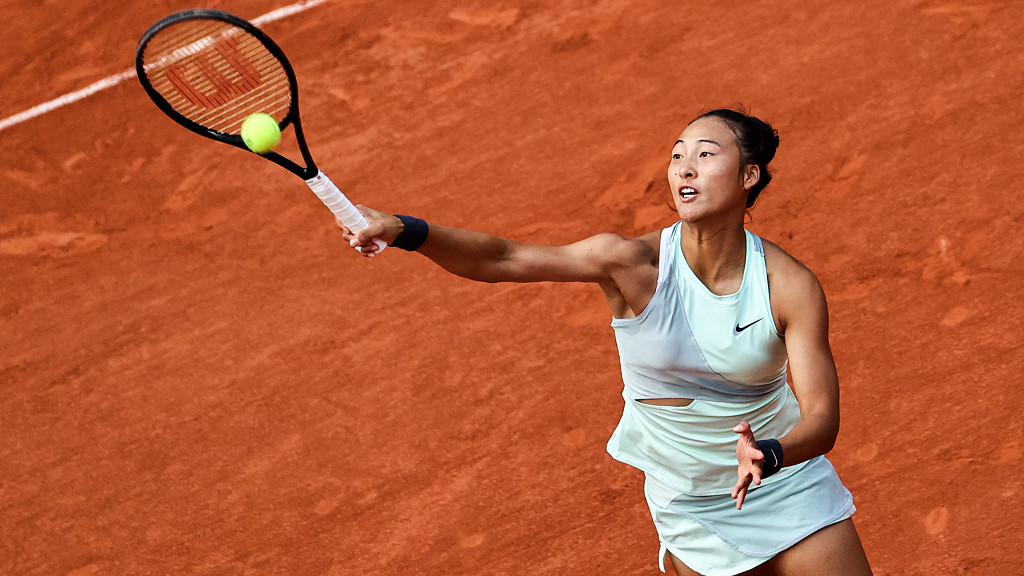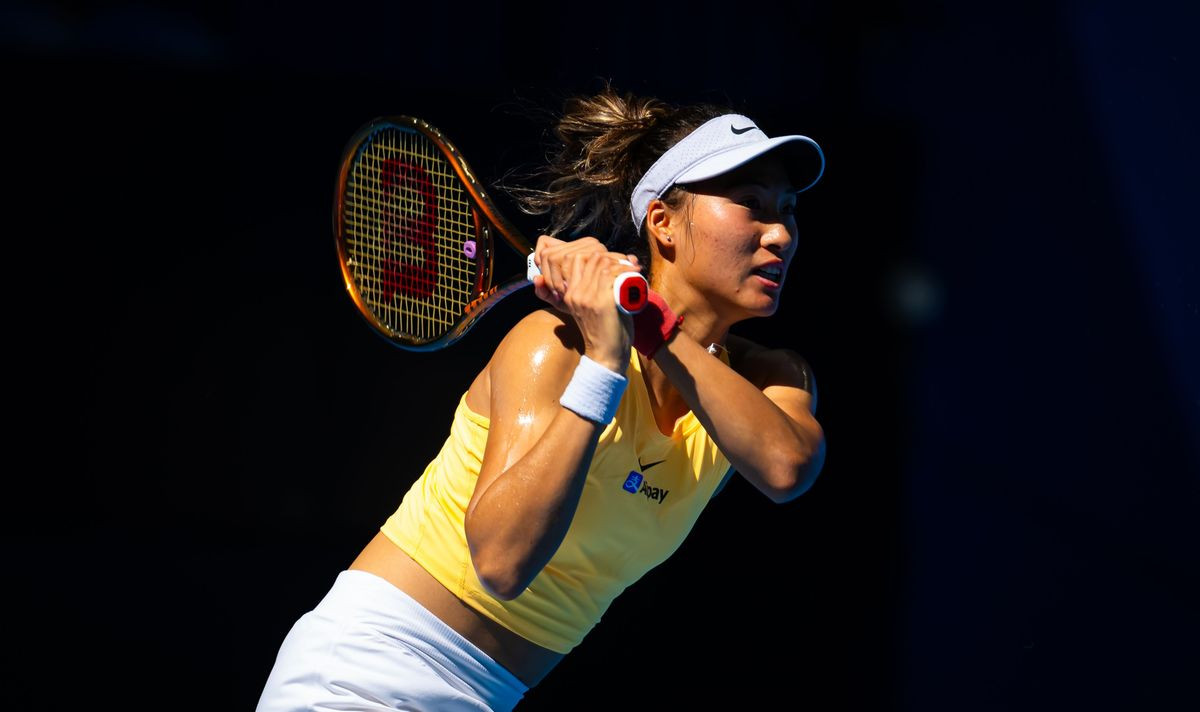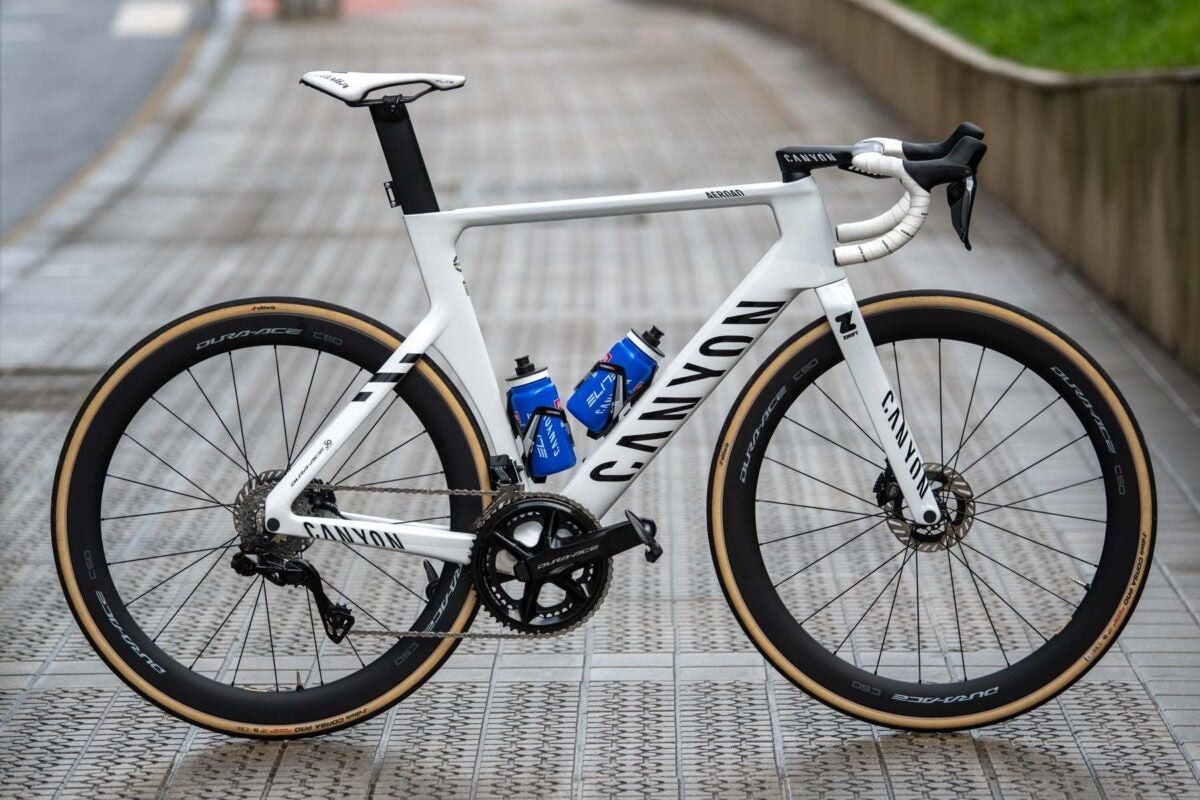The queen of Roland Garros was dethroned Thursday in the Olympic semifinals – by a different kind of queen.
Qinwen Zheng – or QUEEN-wen, as she enjoys being called around the WTA Tour – took out No. 1 Iga Swiatek, 6-2, 7-5, in a stunner that will give China a chance to win its first gold medal in tennis on Saturday.
Swiatek, a four-time French Open champion at this venue, hadn't lost a match at Roland Garros since the 2021 quarterfinals. She came into the Olympics as a massive favorite, but perhaps felt a different kind of pressure trying to win gold for Poland, her home country.
Instead, she'll have to settle at best for the bronze medal after a perplexing performance where her normally reliable baseline game produced a barrage of unforced errors.
After Zheng dominated the first set, Swiatek took a long bathroom break just as she did Wednesday after losing the second to American Danielle Collins. And just as she did the day before, Swiatek came out refocused and quickly shot out to a 4-0 lead.
But Zheng, the No. 6 seed who broke out earlier this year by making the Australian Open final, did not give up on the set and manged to retrieve the two breaks to level things at 5-5. Swiatek then lost her serve with more uncharacteristic errors from the baseline, allowing Zheng an opportunity to close out the match.
After Zheng staved off a break point with a deft – and gutsy – drop shot, Swiatek sailed a routine backhand long for her 36th unforced error and then missed a return on match point as Zheng fell to the ground in celebration.
Zheng will play either Donna Vekic of Croatia or Anna-Karolina Schmiedlova of Slovakia for the gold medal.
Zheng Qinwen became the first Chinese tennis player to win an Olympic medal in singles as she produced the biggest shock of the tournament, toppling Iga Swiatek, the world No 1, 6-2, 7-5 on Thursday to reach the women’s gold medal match.
It is a monumental victory for Zheng against an opponent who was heavily favoured to win her first Olympic gold medal after dominating at Roland Garros in recent years. Swiatek entered Court Philippe-Chatrier on Thursday on a 25-match winning streak at this venue, having won three consecutive French Open titles and four in total.
“This means everything to me because finally I broke the stage I always have in my head, I finally showed I could beat the world No 1 on her best surface, at Roland Garros,” said Zheng. “It really does mean everything. I always knew I could do it but there’s a difference between knowing you can and showing it.”
Zheng, the sixth seed and a finalist at the Australian Open this year, is a tremendous talent with a sense for the big stage. While the 21-year-old had not produced her best tennis earlier in the week, she dragged herself to this semi-final through her willpower and mental strength, winning consecutive three-hour, three-set matches against Emma Navarro of the United States and Germany’s Angelique Kerber to end the former No 1’s career.
A day later, Zheng stepped on to Court Philippe-Chatrier fully aware that the pressure was on Swiatek and she played with total freedom from the beginning. As Zheng commanded the baseline, suffocating her opponent with a heavy forehand and mixing up loopy balls with drop shots, the Polish player struggled badly to find her range.
Swiatek simply could not play with the freedom she desired, errors flowing from her racket, and even after establishing a 4-0 lead in the second set, the 23-year-old failed to shake off her nerves. She was gradually pulled back in the second set by Zheng, who found big serves when most needed and held her nerve at the end to win seven of the final eight games.
Although Zheng entered the match with an 0-6 record against Swiatek, she has shown glimpses of her potential against the No 1 over the years, most notably when she pushed Swiatek to three sets on the same court in the fourth round of the 2022 French Open. It felt like only a matter of time until Zheng achieved such a significant win on a big stage.
“I know the fight is not over,” she said. “It’s not the end. The tennis tournament is very long. I’m really happy but at the same time I’m waiting for more. I’ve made history already but I don’t want to stop here.”
For Swiatek, the pressure of this once-in-a-lifetime opportunity to win the Olympic gold on her favourite court was just too much in the end. After the match she was in tears as she could not hold back her disappointment and she was forced to pause an interview so she could regain her composure. She will still have a chance to leave Paris with a medal in the match for bronze.
Meanwhile, Katie Boulter and Heather Watson’s solid run in the women’s doubles came to an end in the quarter-finals as they fell 6-3, 6-1 to the formidable Italian pairing of Sara Errani and Jasmine Paolini, the third seeds and finalists at the French Open this year. Carlos Alcaraz, the Roland Garros and Wimbledon champion, moved within touching distance of a medal himself by defeating Tommy Paul of the US 6-3, 7-6 (7) in a high-quality quarter-final.
Iga Swiatek has been the monster of Roland Garros over the past five years. The Olympics turned out to be a different challenge.
Playing on the same surface where she has won four French Open titles since 2020, Swiatek was stunned by China's Zheng Qinwen 6-2, 7-5 in the semifinals of the women's singles draw, bouncing out the heavy favorite to take gold.
Zheng was hardly an out-of-nowhere competitor as the No. 7 player in the WTA rankings, but the 21-year-old was a heavy underdog with a 0-6 record against Swiatek. She was also facing a player who had won the French Open at the same stadium only two months ago, with a 32-2 total record in Paris. And she had to survive match point in her previous match against American Anna Navarro to reach the quarterfinals.
It should have been relatively simple for Swiatek, who was competing for her gold on easily her best surface. She ended up making it difficult.
Swiatek broke Zheng on her first chance in the first set, but then started to make a number of uncharacteristic mistakes. Zheng won six straight games to take the set, with Swiatek visibly frustrated as she made 16 unforced errors.
The Pole regrouped from there, winning the first four games of the second set to restore order. And then the mistakes came back. Zheng broke her three times in a row, again, and took advantage of another 20 unforced errors in the second set. As Swiatek's return landed long on match point, Zheng collapsed to the court like she had just won a tournament.
She at least made history. Zheng is now the first Chinese tennis player to ever reach the Olympics final, and she is already guaranteed to be the first medalist in the country's history.
Iga Świątek, the Polish world No. 1 and top seed in the Olympic tennis tournament, lost in the semifinals Thursday to China’s Zheng Qinwen, a massive upset in the women’s singles.
Świątek went down in straight sets, losing 6-2 7-5. The Pole has been a force at Roland Garros, the venue for the tennis at these Games, where she has won four French Open titles, including the last three in a row.
Świątek, who is the dominant force on clay in women’s tennis, entered the Paris Olympics as the overwhelming favorite to win gold.
“It’s truly indescribable how thrilled I am right now,” Zheng told the Olympics.com. “I defeated the world No. 1, the player who has been reigning champion at Roland Garros for years.
“This journey has not been easy. Additionally, having played over six hours on court in the past few days and spending around eight hours on court within three days, I felt like I was driven by sheer determination.
“I know that in a regular women’s match, my stamina might have run out after such extended play. But for some reason, today, my energy levels remained high throughout. I was certain that, even if the match went into the third set, I would fight until the last breath.
“Even if I had to play for another three hours for my country, I felt I could manage it. Beating the world No. 1 at the Olympic stage means a lot to me.”
Zheng jumped out to a dominant first set win, but five-time grand slam winner Świątek looked set to force a deciding tiebreaker with a roaring start to the second. But Zheng climbed all the way back from 0-4 down, sending the heavy favorite off to the bronze medal match.
It’s Świątek’s first loss at Roland Garros since 2021.
Zheng, the No. 6 seed, will face either Donna Vekić of Croatia or Slovakia’s Anna Karolína Schmiedlová in the gold medal match. The Chinese star was 0-6 against Świątek before this match
Świątek will face the loser of the match between Vekić and Schmiedlová in the bronze medal match.
Świątek had cruised through the tournament to this point, dropping one set in her previous four matches. At home on the clay, the Pole had been playing with a breezy confidence in her opening matches of the tournament until being pushed by Danielle Collins on Wednesday to a tiebreaker before the American was forced to retire.
But Zheng had given her trouble on this court in the past. In 2022, the now world No. 7 took the first set from Świątek, who rallied after that to eventually ease past the then-newcomer to the WTA Tour.
Zheng has had a bit more dramatic path to the final. She survived the last two matches in tiebreakers, including ending German Angelique Kerber’s career on Wednesday in the quarterfinals.
PARIS — Iga Swiatek, the world No. 1, will have to settle for a bronze medal at best in the Olympic tennis tournament after losing to Zheng Qinwen of China.
The sixth seed did what was nearly impossible by beating Swiatek on the clay of Roland Garros, becoming only the third player, after Simona Halep and Maria Sakkari, to do so in the previous five years. Zheng triumphed 6-2, 7-5, coming back from 0-4 down in the second set after the Pole and four-time French Open champion looked to have started rolling downhill.
On another hot and steamy day in Paris, Zheng attacked Swiatek from the beginning, taking the ball early and pounding it back at the 23-year-old, giving her repeated doses of her own medicine. Swiatek hardly helped her own cause, as her strokes, usually so impeccable on clay, were absent for much of the match. Even her backhand, often the more reliable of her two shots, too often flew off the court as she pressed to try to find the tennis that has made her the world’s dominant female player for more than two years.
Even when, at 1-2 down in the first set, she immediately broke Zheng back to love, Swiatek could not sustain the shift in momentum. Zheng attacked her second serve throughout, consigning Swiatek to winning just four of 15 points behind it, and teasing out double faults as the world No. 1 felt forced to go bigger.
Zheng and Swiatek battled in front of a packed crowd on Court Philippe-Chatrier, whose noise and energy level grew as the upset became more likely. Swiatek, who has worked on trying to maintain her composure, grew frustrated as she struggled to play with the easy dominance that generally characterizes her play on her favorite court, screaming to the Polish coaching box at one point late in the second set.
Swiatek struggled to live with Zheng’s high, looping forehands that sapped her energy and forced her to generate pace, a tactic that Zheng herself had found difficult to handle against Germany’s Angelique Kerber in the previous round.
In the crucial 11th game of that set, Swiatek committed four errors from the baseline, including a backhand well wide, to give Zheng the chance to serve out the match. Having led 4-0, even her speciality — playing fearlessly with a lead — deserted her when she needed it, and Zheng capitalised, saving a break point that would have brought a second-set tiebreak before clinching the match.
Swiatek will now face either Donna Vekic of Croatia or Anna Karolina Schmiedlova of Slovakia in the bronze medal match, while Zheng will play the other for Olympic gold.


















